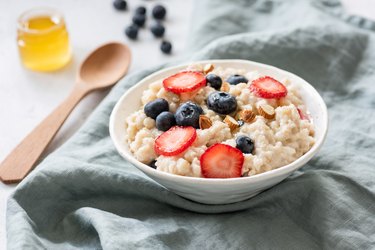
You've committed to a 5K, and you've started the training process. Luckily, you know that what you put into your body will influence your ability to go the distance.
What you eat when training for a 5K isn't terribly different than any other well-balanced meal plan. If you're an elite runner knocking out dozens upon dozens of miles per week, you may need a little extra of certain nutrients. Otherwise, aim for mix of quality carbs, proteins and fats for maximum performance.
Video of the Day
Video of the Day
Get the Right Macronutrient Balance
You need all of the three major macronutrients — carbohydrates, protein and fat — to perform at your best. Too little, or too much, of any one may slow you down.
Carbs: Often, runners are steered toward lots of carbs, as they provide energy for your workouts. However, when training for a 5K, you're most likely not exceeding 20 miles per week in training. This amount of running doesn't require a major boost in your carb intake.
Keep it at about 2.5 grams per pound of your body weight daily. This means if you weigh 140 pounds, you'll aim for about 180 grams daily. Go for whole grains, such as quinoa and brown rice, as well as sweet potatoes and winter squash.
Protein: Protein is an essential component of all your tissues. It's especially valuable in helping you build and repair muscle, which you're doing a lot of while training. The average person training for a 5K does fine with about 0.5 grams of protein per pound of body weight, so that 140-pound person benefits from 70 grams per day. Lean proteins, such as fish, white-meat poultry and trimmed steak are ideal options.
Fats: Fats get a bad rap, but the unsaturated kind provides support for vitamin absorption and some, such as the Omega 3s, reduce inflammation so you recover from your runs adequately. Between 20 percent and 35 percent can come from fat, says the Institute of Medicine. Avocado, salmon and nuts are good sources of unsaturated fats.
Other Specific Nutrients
If you eat a variety of foods daily and choose mostly healthy, unprocessed ones, you'll get a good mix vitamins and minerals to support healthy 5K training. If you have specific dietary limitations, such as a dairy intolerance or vegetarian eating plan, you might need to focus on specific nutrients. Women runners sometimes need a little extra vitamin and mineral support, too.
Calcium: This mineral supports bone health and muscle function. Dairy provides good amounts, but if you're an almond milk and soy yogurt fan, eat lots of leafy greens and canned fish with bones, such as sardines.
Iron: Runners are vulnerable to iron loss from pounding the pavement, particularly vegetarian runners, who can become deficient if not diligent. Women in particular may develop anemia, characterized by fatigue, pale skin and listlessness. Get iron from red meat, but also from vegetarian sources such as leafy greens and lentils.
B Vitamins: A whole complex of B vitamins exist and they're important to your energy levels. If you're deficient, you may feel like every training run is a chore. Get B vitamins in animal products, fortified whole grains and nuts.

Meal Plan Ideas
Your caloric intake depends on your size, your weight goals and how active you are in addition to training. Increase or decrease portion sizes according to your caloric needs, but the general composition of these meals can stay the same.
- Breakfast: Oatmeal with berries, milk and 1 tablespoon of walnuts
- Mid-morning snack : 1/2 banana and 1 teaspoon of peanut butter
- Lunch: Turkey sandwich on a whole-grain pita with lettuce, tomato and mustard, yogurt, apple
- Mid-afternoon snack: whole-grain crackers, low-fat cottage cheese and an orange
- Dinner: 1 to 2 cups of whole-wheat spaghetti, marinara sauce, lean ground beef and a large green salad with olive oil-based dressing.
Most training runs for a 5K, especially if you're new to the distance, are going to be modest enough that you don't need a pre-run snack or fuel during the run. Have a small snack of about 100 to 200 calories, however, if it's been more than 3 hours since your last meal. For example, if you run first thing in the morning prior to breakfast, have a banana or 1/2 of an energy bar before you head out.